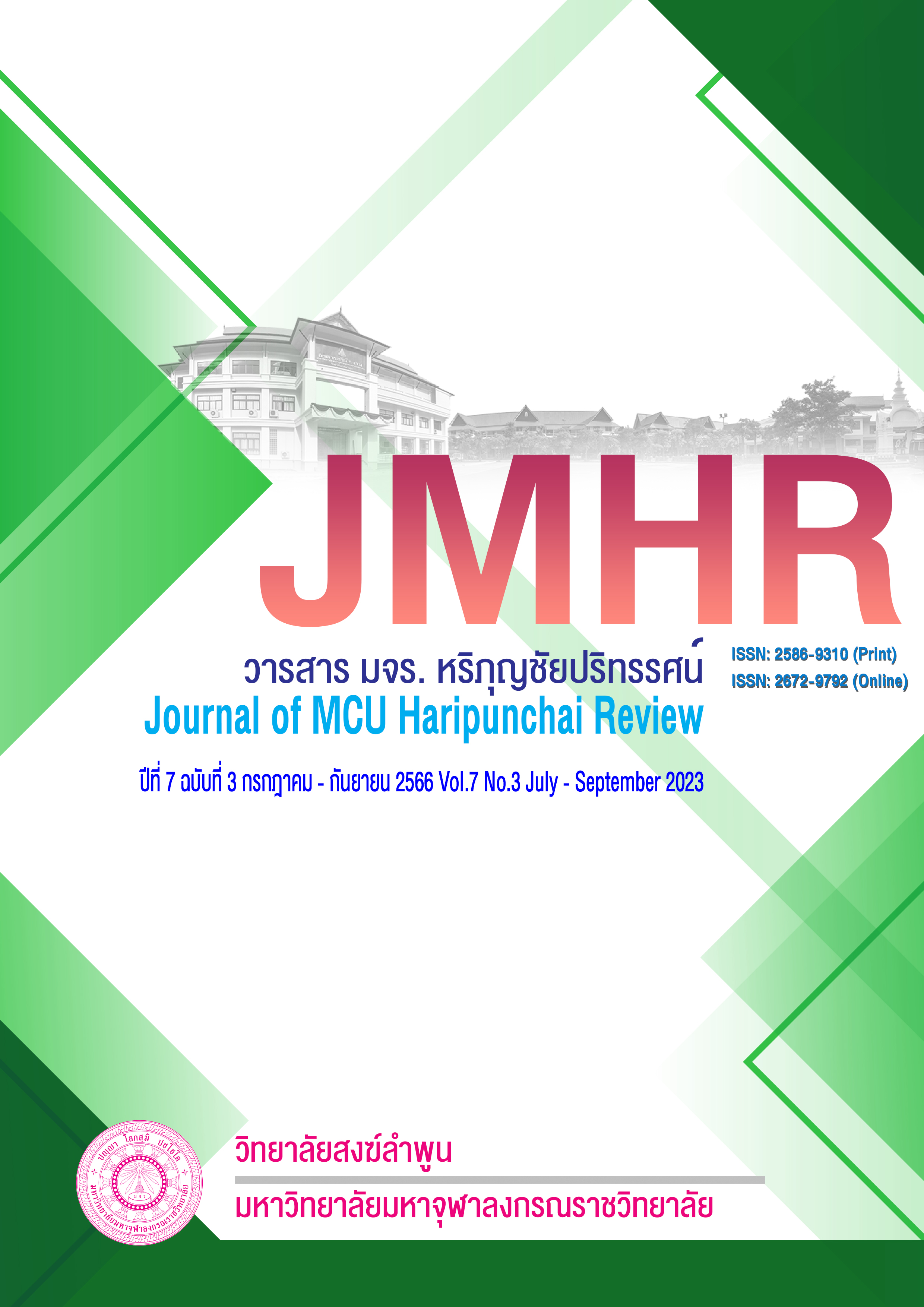The The application of Buddhist principles in educational administration in the 21st century.
Main Article Content
Abstract
The aim of this article is to present the concept of applying the principles of Buddhism, namely the 7 principles of Sappurisadhamma, for educational administration for the 21st century to create awareness. and realize the importance and necessity of educational administration for change Educational administrators must have high 2. Atthanyuta: knowing the results In this section, the administrators know the results or benefits that will occur. Able to analyze the results that will be obtained from various operations. 3. Attanyuta: Knowing oneself Educational administrators must analyze aptitude knowledge The ability of the co-workers. Educational administrators must know budget estimates that can be used for school administration. expectations and look at the future with vision. Have a creative mind Give importance to learning and create intellectual excitement in schools and classrooms. According to the principles of Sappurisadhamma 7, namely 5. Kalanyuta: knowing time, educational administrators must know how to plan the appropriate time for each administrative task. Education administrators should study what needs of those communities. will result in true community cooperation 7. Pukkhalo Paranyu acquaintance with person Executives should know that each individual In order to be able to choose jobs for each individual according to their abilities and aptitudes in order to make the operation run smoothly.
Article Details

This work is licensed under a Creative Commons Attribution-NonCommercial-NoDerivatives 4.0 International License.
References
เกษม จันทร์แก้ว. (2540). โครงการสหวิทยาการบัณฑิตศึกษา สาขาวิทยาศาสตร์สิ่งแวดล้อม. พิมพ์ครั้งที่ 3. กรุงเทพมหานคร : มหาวิทยาลัยเกษตรศาสตร์.
กระทรวงศึกษาธิการ. (2546). พระราชบัญญัติการศึกษาแหงชาติ พุทธศักราช 2542 แก้ไขเพิ่มเติม (ฉบับที่ 2) พุทธศักราช 2545. กรุงเทพมหานคร : คุรุสภา.
ถวิล จันทร์ชนะ. (2534). การบริหารเชิงกลยุทธ์และนโยบายธุรกิจ. กรุงเทพมหานคร : โรงพิมพ์กรุงธนพัฒนา.
พระเมธีธรรมาภรณ์ (ประยูร ธมฺมจิตฺโต). (2539). คุณธรรมสำหรับนักบริหาร. กรุงเทพมหานคร : มูลนิธิพุทธธรรม.
พระธรรมโกศาจารย์ (ประยูร ธมฺมจิตฺโต), (2549). พุทธวิธีบริหาร. กรุงเทพมหานคร : มหาวิทยาลัยมหาจุฬาลงกรณมหราชวิทยาลัย.
พระธรรมกิตติวงศ์ (ทองดี สุรเตโช). (2548). ภาษาธรรม. กรุงเทพมหานคร : สำนักพิมพ์เลี่ยงเชียง.
พระธรรมปิฎก (ป.อ. ปยุตฺโต). (2540). ภาวะผู้นำความสำคัญต่อการพัฒนาคน พัฒนาประเทศ. กรุงเทพมหานคร : ธรรมสภา.
พระปลัดมานัสชัย เมตฺตจิตโตฺ . (2548). การศึกษาปญหาการบริหารงานวิชาการของโรงเรียนพระปริยัติธรรม แผนกสามัญศึกษา ในจังหวัดนครราชสีมา. วิทยานิพนธคุรุศาสตรมหาบัณฑิต. สาขาวิชาการบริหารการศึกษา. สำนักงานประสานงานบัณฑิต : มหาวิทยาลัยราชภัฏราชนครินทร.
พระราชบัญญัติการศึกษาแห่งชาติ พ.ศ. 2542. มาตรา 4: “ครู”. [ออนไลน์]. แหล่งที่มา : http://web.krisdika.go.th/data/law/law2/%A198/%A198-20-2553-a0002.htm [5 มิถุนายน 2560].
วันทนา เมืองจันทร์. (2544). การปฏิรูปการศึกษา : คุณธรรมของผู้บริหารกับบทบาทในการประกันคุณภาพการศึกษา. วิทยาจารย์. 100 (4): 21.
ศิริวรรณ เสรีรัตน์ และคณะ. (2545). องค์การและการจัดการ. กรุงเทพมหานคร : ธรรมสาร.
สมเด็จพระสังฆราช (เจริญ สุวฑฺฒโน). ธรรมศึกษา. [ออนไลน์]. แหล่งที่มา : http://mahamakuta. inet.co.th/study/study64/mk6412.html. [5 มิถุนายน 2560].
สมคิด บางโม. (2546). องค์กรและการจัดการ, กรุงเทพมหานคร : จูนพับลิชชิ่ง.
Bhojwani, V. (2012). What is the difference between management and administration? [ออนไลน์]. แหล่งที่มา : http://wiki.answers.com/Q/What_is_the_difference_between_management_
and_administration [ 5 มิถุนายน 2021].
Othman, M.Z. (2011). Educational management and administration. [ออนไลน์]. แหล่งที่มา : http://www.scribd.com/doc/52442951/Educational Management-and-Administration [ 5 มิถุนายน 2021].


